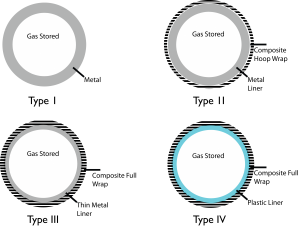Learn about CNG
The following information will help you learn more about CNG and whether or not this might be the right decision for you. Please take your time with this information and if you find you have questions we have not answered, shoot us an email or give us a call. We’ll do our best to find/provide the information.
What is CNG?
Wikipedia defines CNG as: “Compressed natural gas (CNG) is a fossil fuel substitute for gasoline (petrol), Diesel fuel, or propane/LPG. Although its combustion does produce greenhouse gases, it is a more environmentally clean alternative to those fuels, and it is much safer than other fuels in the event of a spill (natural gas is lighter than air, and disperses quickly when released). CNG may also be mixed with biogas, produced from landfills or wastewater, which doesn’t increase the concentration of carbon in the atmosphere.
CNG is used in traditional gasoline internal combustion engine cars that have been converted into bi-fuel vehicles (gasoline/CNG). Natural gas vehicles are increasingly used in the Asia-Pacific region (especially Pakistan and the Indian capital of Delhi, Ahmedabad ), Latin America, Europe, and North America due to rising gasoline prices. In response to high fuel prices and environmental concerns, CNG is starting to be used also in tuk-tuks and pickup trucks, transit and school buses, and trains.
The cost of this conversion is a barrier for CNG use as fuel and explains why public transportation vehicles are early adopters, as they can amortize more quickly the money invested in the new (and usually cheaper) fuel.”
There are two types of CNG powered vehicles
Dual-fuel–which is a machine which can run on either gasoline or compressed natural gas, or a combination thereof–such as in the case of diesel, which is a mixture of 60% CNG and 40% diesel. This type of vehicle is retrofitted to use both fuel’s and is much more cost-efficient than a dedicated machine.
Dedicated–this is a vehicle that has been converted or manufactured to run solely on CNG. If you are looking for such a vehicle straight from the manufacturer, expect to pay $10,000 or more than a traditional gas vehicle.
WHAT WE DO
CNG COMPLETE performs dual-fuel conversions, leaving your original fuel system operational and intact. We add the alternate CNG fuel system to your vehicle, so you can take advantage of both!We install a convenient indicator for the CNG fuel, with a control switch which allows you to change between CNG and gasoline/diesel, even while your vehicle is running. The great aspect of CNG is that if the fuel is used up, the vehicle will automatically switch over to gasoline/diesel. Your indicator will let you know that the switch has been made.
Benefits of CNG
- Saves Money – CNG has historically been cheaper than traditional fuels (gasoline/diesel). In Utah, the average cost is $1.56 a GGE (Gasoline Gallon Equivalent), compared to an average of $3.80 at the writing of this page.
- Bi-Fuel – Change to either fuel with the push of a control switch.
- Increased travel distances – When you add a CNG tank to your vehicle, you have additional fuel. Additional fuel means added miles–which, depending upon the size of the tank installed, could add another 150-250 miles.
- Domestic Fuel – CNG isn’t dependent on foreign oil. That means we’re not affected by their constant price increases! You’ll save even more in the future, because gasoline will continue to rise faster than natural gas.
- It’s Environmentally Friendly – There are fewer emissions and hydrocarbons are virtually eliminated.
- Engine Lasts Longer, Runs Cleaner, Quieter – No carbon deposits which create friction and engine wear. No carbon deposits also means no clogging and dirtying of the plugs. Even the Catalytic Converter lasts longer, with less engine noise because of the higher octane of natural gas.
- Fewer Oil Changes – Carbon deposits which dirty the engines oil are eliminated.
- Increase the value of your car – Many times, the cost of the conversion kit increases the resale value of your vehicle, so long as the system isn’t outdated technology.
- Diesel Power Increased – Unlike gasoline engines, diesel’s also benefit from a dramatic power increase, due to the 60/40 blend. So if you’re used to pulling heavy loads, you not only get better power, you save fuel costs while doing so.
Other Things You Should Know About CNG
- Potential Power Loss – The average anticipated power loss with a conversion kit is 10-20% power. But the kits used by CNG COMPLETE are cutting edge, minimizing that loss to 3-5%, which becomes almost negligible. Just remember that you can always switch back to gasoline with a duel-fuel system.
- Hotter Burning Temperature – Because CNG burns hotter than diesel or gas, it can potentially damage your catalytic converter or valves if the fuel mix isn’t properly calibrated. CNG COMPLETE technicians have been certified to ensure this is not a problem–integrating the duel-fuel system with your vehicle’s on-board computer. We make sure your fuel will be mixed perfectly at all times.
- Fueling Station Availability – Though they are gaining in popularity, there are still areas of the United States that have few or no fueling stations. Click here to see stations near you.
- Power-Train Warranty – If you have a non-EPA fuel system installed into your new vehicle, your power-train warranty is usually voided. However, because CNG will not harm the power-train, but actually extend engine life, fuel cost savings is often greater than any repairs which are likely to occur.
- Fuel-Tanks Are Required – To use CNG requires an additional, specialized tank attached to the vehicle. The tank is usually placed in the cargo area or trunk, though some can be retro-fitted under some vehicles for an extra charge. There are four types of tanks:
- TYPE 1: Heavy steel construction
- TYPE 2: Steel liner with carbon fiber wrapping around the waist of the tank. Sometimes the steel liner uses fiberglass instead of carbon fiber.
- TYPE 3: Aluminum liner with carbon fiber wrapping the whole tank, including the ends.
- TYPE 4: A polyethylene liner with a cylinder wrapped in carbon fiber.

- EPA Certification – Only vehicles and kits which meet EPA standards can be certified. These are put through rigorous tests which are expensive and add to the cost of such kits (upwards of $4,000-$6,000 more than non-certified kits). “EPA qualified” is a term used by some businesses, but doesn’t have a specific meaning…this, in reality, a sales tactic to get your business. So what are the benefits of getting an EPA Certified kit? Tax-credits in “EPA States”. However, Utah is NOT an EPA State.
